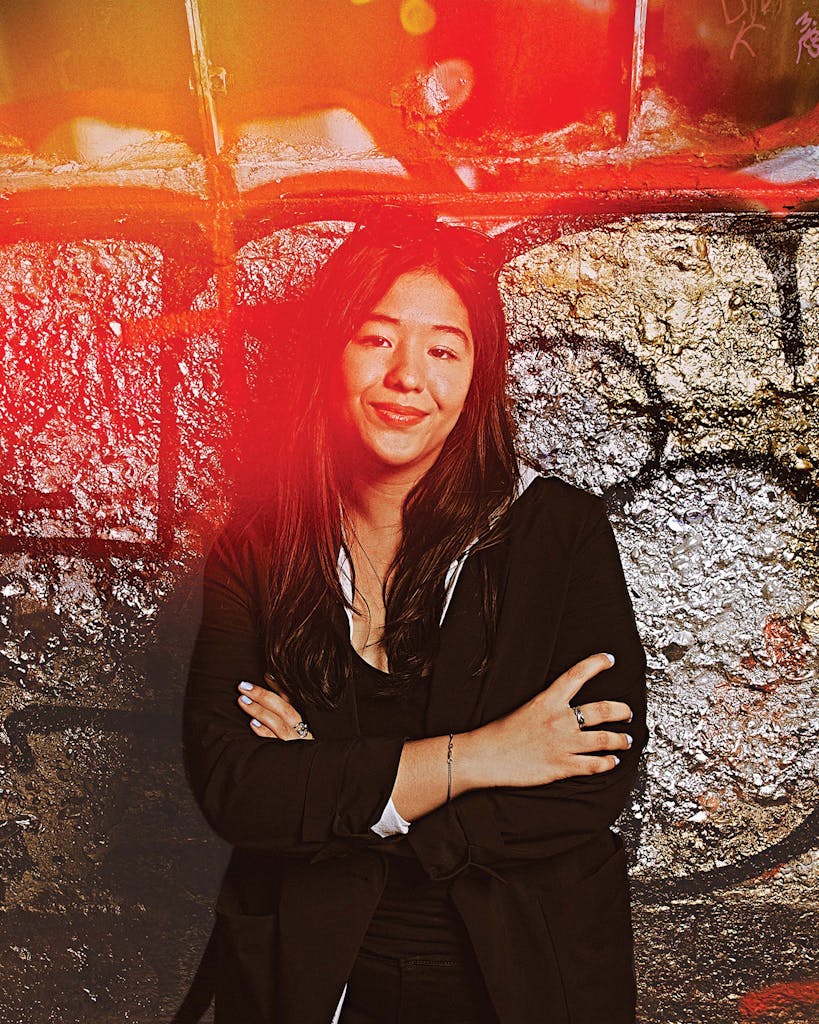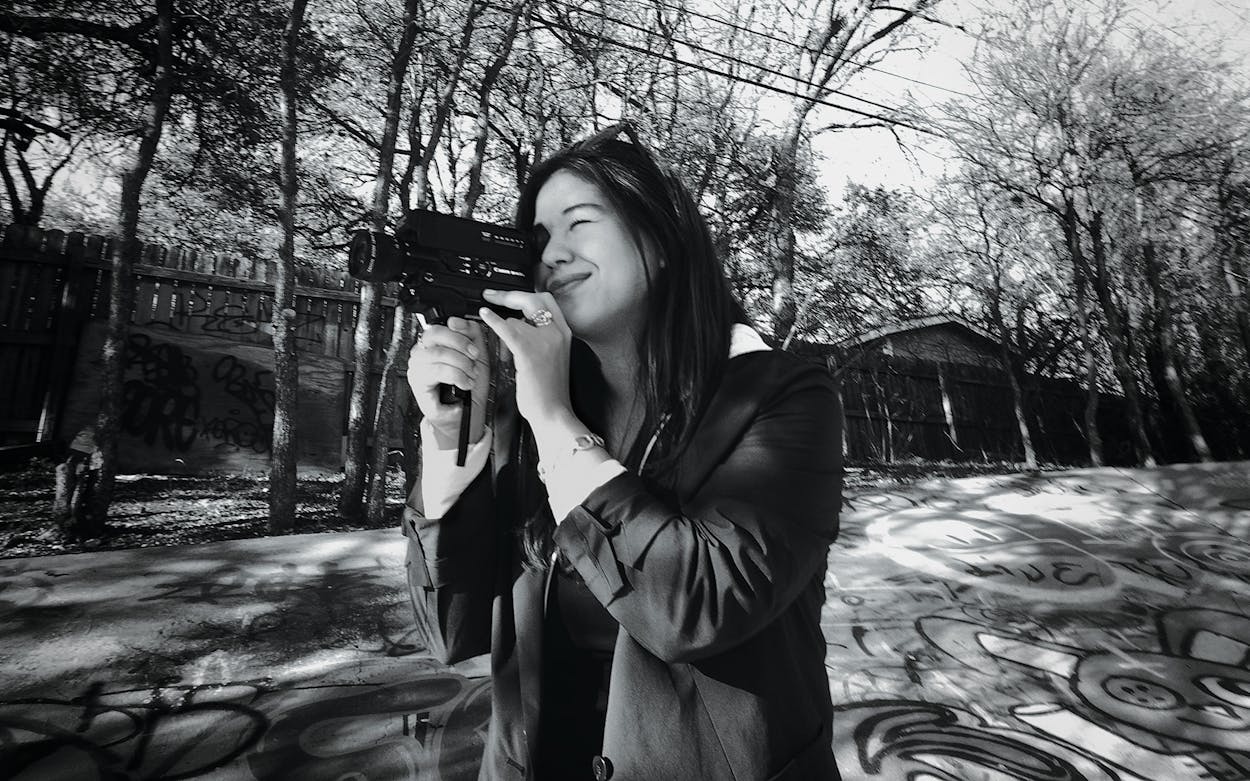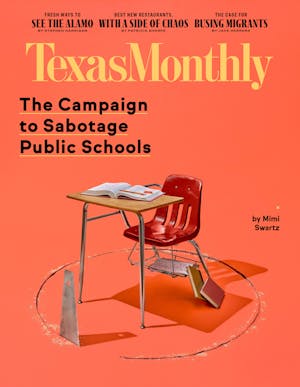Katherine Propper was cruising through Central Texas in February last year with a vanload of rappers when she stumbled upon the next scene for her movie. The young Austin director, sitting in the wayback of the van with her sound engineer, was making a film about a fledgling hip-hop performer on a road trip of self-discovery when the driver pulled over for a pit stop at an RV park near Manor, just east of Austin’s creeping suburban sprawl. That’s when Propper saw a cow, a couple of horses, and a Longhorn standing in a field. The creatures intrigued Propper, who grew up in the suburbs of Los Angeles, and she sought out their owner to ask permission to film them. His name was James Burke and he said yes, then told her he was selling his small ranch and leaving—Austin was getting too big for him and he was ready to move on after fifty years.
Burke was a quiet, ruminative 77-year-old, the opposite of her cast of young, Instagram-frantic rappers. Propper smiled. The movie she was making, Lost Soulz, dealt with youth, friendship, and music—but it was mostly about trying to find your home in the world. She knew she had to put the old rancher and the young rappers together on-screen.
As the crew set up, the director asked the rancher to appear on camera, and he again said yes. She briefed her actors on what to ask him and then started shooting as they stumbled out of the van, adjusted to their surroundings, gazed at the Longhorn, petted the horses, and talked with Burke. Sometimes she stopped the action and fed them questions. Then she let them act.
Seven months later, Propper sat at a computer in a small house in Central Austin with her editor, Isaac Burns. A window air-conditioning unit hummed in the corner. Propper (pronounced “pro-pair”) was dressed in a gray T-shirt and black yoga pants. She has an infectious laugh and a calm sense of purpose, and she leaned back in a chair and watched as Burns scrolled through the ranch scene. Taped to the top of one of the monitors were a couple of cards with the entry deadlines for the Cannes, Sundance, SXSW, and Tribeca film festivals. There are thousands of film festivals in the world. Of course she’d like to premiere at one of the big ones—for the buzz and the
cachet—but the smaller ones are good too. “I like interacting with people because it’s sort of the reason I make films,” she said. “I like hearing from people that a film is moving or important to them. Regional festivals allow for those types of impromptu moments.”
It’s not hard to see why the 29-year-old is aiming way up. As a film student in the University of Texas at Austin’s esteemed graduate program, she achieved an unusual amount of success. Her first narrative short was shown on KERA in Dallas, her second was screened at Tribeca, and her third played at 2022’s SXSW, where it won a special jury prize, and then had its online premiere on the New Yorker’s website (accompanied by a glowing review this past July). And now she is making the difficult leap into feature films.
Most of Lost Soulz is scripted, but Propper is open to inspiration and accidents during shooting and encourages her actors to improvise, as they did that afternoon in Manor. Her process isn’t particularly efficient or predictable, and that spontaneity extends into the editing room—a method she learned from some of her favorite directors, including longtime Austin resident Terrence Malick. Propper watched as Burns rewound to the start of the scene and hit play.
On-screen, some of the actors were asleep as the driver pulled up at the field. The van stopped. The young people, dressed in colorful jackets and sweats, emerged, bleary-eyed. The cow grazed in the distance.
“Oh my God!” said one of them. “Oh my God!”
“Where we at?”
“I don’t even know, bro.”
The six rappers—Black, Latino, white—their hair springing out from their hoodies, began tentatively petting and feeding the horses.
“You’ve lived here for how long?” one of the youngsters, named Seven, asked Burke.
“Fifty years,” he replied in his slow drawl, and then said something unintelligible.
“I don’t know what he’s saying there,” Propper said. Burns played it back a few times, to no avail. The muddled line would have to be cut. On-screen, the cow chewed some grass.
Propper suggested a couple more changes, and then Burns rolled the scene back to the beginning and they watched it again. “Okay,” she said, “I thought it was really close.” But she wanted to make some fixes. Referring to Seven, she said, “After he laughs we need to change out the dialogue to something else. Something else, something else, something else.” Just what it might be eluded her for the moment. A few seconds later, still noodling, she told Burns, “I like seeing the horse.”
When Propper and Burns finally finished the scene, the dialogue told a story of its own, one of youth and age, new Austin and old, the exuberance of just starting out and the melancholy of wrapping up.
“How long have you lived here?”
“Fifty years.”
“That’s a long time, man.”
“My whole career, spent my whole life right here, since we were married in 1967.”
“Looks like you’re living the dream, man.”
“It’s been a great run. I’m near the end of my time.”
“Proud of you man, you deserve it, looks like you work hard.”
“Thank you. I put my whole life into this property.”
Burns hit stop. “That worked,” said Propper. “Is there a close-up of the cow?”
Propper didn’t grow up wanting to be a director. Her mother was from Korea and her father New York. Propper was raised in Burbank, north of Los Angeles. She watched the Disney Channel and Turner Classic Movies and listened to Britney Spears and Coolio. She also heard stories about her father’s famous cousin, actress Helena Bonham Carter, and her heroic great-grandfather Eduardo Propper de Callejón, who, as a Spanish diplomat in France when the Nazis took over in 1940, saved hundreds of fleeing Jews by helping them secure transit visas to Spain.
Propper was an accomplished student, practical but with an artistic side. She thought she’d be a good lawyer but didn’t have any real plan when she got to Georgetown University. After attending one of the university’s Ignatian Silent Retreats and practicing a spiritual exercise designed, in her words, to help “hear the deepest yearnings of my soul,” she felt she was being called to the arts.
What she really wanted to do, she figured out, was make movies. She set about watching at least one film a day and sometimes two. She made her way through entire oeuvres (Frank Capra, John Singleton, Hou Hsiao-Hsien) and genres (Italian Neorealism, French New Wave, Taiwanese New Wave). She watched directors’ commentaries. She took classes on Kurosawa and on Catholicism in cinema. She also saw Malick’s 2011 film Tree of Life. She was intrigued by the way the director created moods, sometimes at the expense of the plot, and how he juggled the playful and the experimental. She studied his other films and read about how spontaneous he was on set and in the editing room, where he would often add voice-overs and rejigger whole scenes. Malick was flexible with his script and his actors, pushing them to improvise.
She arrived at UT-Austin in fall 2016. Propper was excited about coming to the state that had nurtured such indie-minded directors as Kat Candler, David Gordon Green, Richard Linklater, David Lowery, Malick, and Jeff Nichols. She impressed her teachers almost immediately. “She’d seen more films than I had,” said her editing professor Anne Lewis. “She’d seen so much film and thought about it so completely that she had the freedom to begin breaking the rules.”
Lewis helped Propper on her first UT-Austin narrative short, Pentecost, a six-minute religious fable about a little girl, her preacher father, and a rattlesnake. Propper wound up adding all the dialogue in editing—not something rookie directors generally do. “I learned that I could write a film in the edit,” Propper said, “rewrite the voice-over or change everything and make it work. If I didn’t have a snakebite in a scene, I could create one with the editing—the implication of one.” Lewis teaches an intuitive form of editing and hammered home a lesson that Propper took to immediately. “She taught me that what you remember most in good films are the good moments. People don’t really care that much about plot. So, as an editor, I’m always looking to elevate strong moments and then see how I can create a plot from them.” It worked: Pentecost, with its dreamy, spiritual vibe, was shown on PBS affiliate KERA as part of its Frame of Mind series.
In her second year at UT-Austin, Propper applied those lessons to Street Flame, a twelve-minute short about a clique of skaters, street artists, and itinerant kids. She had become a fan of movies made with nonprofessional actors such as Benh Zeitlin’s Beasts of the Southern Wild. She found her cast by scrolling Instagram, posting notices on Craigslist, messaging local kids who had the right look, or just approaching teens she saw in line at H-E-B or at the movies.

Propper followed the kids as they tagged and fought and smoked. Though she had a script, she encouraged her charges to say what came naturally. “She’s so good at getting real performances out of nonactors,” said Don Howard, a now-retired UT-Austin film professor who helped her edit Street Flame and urged her to trust her instincts and essentially let the material direct her. “I don’t think you can just grab charismatic people and expect them to be good—the actors are almost always the main reason for the weakness of student films.” The short was accepted into the prestigious Tribeca film festival.
Propper broke all kinds of narrative rules when she made her thesis film, Birds, which weaves together six different stories in thirteen minutes. Birds has no real plot; it drops in on a large cast of characters over the course of a single summer day in Austin. In many ways, it’s a millennial homage to Linklater’s Slacker—a film about a particular time in Austin made by a young director trying to tell a story in a new way.
Again, Propper used nonprofessional actors she found on Instagram, then wrote her script based on their lives and their personalities. Though the film is a playful, sunlit portrait of teen lives, there are hints of menace too—an asthma attack, a dead squirrel, an ominous older dude. Howard was impressed with how Propper worked to balance the light with the dark. “She said, ‘I want that scene with the asthma attack to be threatening but not scary.’ Katherine wants to get right up to that moment but never fall over the edge.”
One of the actors Propper had cast in Street Flame was Sauve Sidle, a former high school football player with springy rainbow-colored dreads who dreamed of being a rapper. Almost from the moment they met—via one of her Craigslist ads—she’d wanted to make a movie inspired by his life. In 2018 he had moved from Austin to L.A. and rapped his way onto a tour with the late superstar Juice WRLD. When Propper and Sidle filmed Street Flame, before he moved, he was working on his music—doing shows, making videos—while sleeping on friends’ couches. She felt he was grappling with what home meant to him; Propper, far from her own home in L.A., could relate. She was also fascinated by hip-hop kids who made careers out of putting songs on SoundCloud and videos on Instagram. So, with a couple of grants and some funding from producers, she set out to make a movie.
She found her cast by her usual catch-as-catch-can methods and with Sidle’s help. She ended up with a diverse group of rappers, including Micro TDH, a Venezuelan with 2.3 million followers on Instagram; Alex Brackney, a burly, bearded Kentuckian; and Krystall Poppin, a Latina from El Paso. They were all natural actors—hip-hop musicians are always performing and improvising, posting photos and making videos for Instagram and TikTok. Propper knew she could direct them.
Lost Soulz follows Sidle’s character, Sol, an aspiring Austin rapper, as he leaves his home to pursue his dreams. Sol has no family to speak of; he lives with his best friend and fellow performer and manager, Wesley, and Wesley’s mom and little sister. Wesley and Sol have a mixtape they’re working on in the studio—they want to finish it, go to L.A., and become famous. They’re not making hard-edged music about life on the mean streets; Sol and Wesley are into emo rap—the moody, lonely words of sensitive young people. One night Sol performs at a house party and impresses the headliners, five rappers on tour heading to L.A. They ask Sol to come along and he leaves Wesley behind—in part because Wesley is passed out from drugs, but also because Sol is ambitious.
The group winds its way west, singing together in the van, stopping to take selfies and videos at Prada Marfa, smoking a lot of weed, and performing in El Paso. The group’s manager says she can get Sol a record deal in L.A., but he becomes increasingly preoccupied with what’s going on back home, especially after he learns that Wesley has OD’d and is in the hospital. Sol feels guilt and anguish and soon has to make a life-changing decision.
Lost Soulz is at its best when the actors do what they do best—freestyle, sing, make music. The most remarkable scene occurs in a West Texas studio, where the engineer plays them a beat and they make up a song on the spot. It all happens organically—first they’re nodding together and getting a sense of the vibe, then one comes up with a verse, and by the time another verse comes around, the others join in. The energy is infectious; they are creating something new as we watch, and the results are electrifying.
To accommodate a much longer running time than she had ever dealt with before, Propper paid more attention to plot than she had in her earlier films, with mixed results. Lost Soulz loses some of its flow near the end, when the story machinations—a drug problem, a recording contract, a falling-out—take over and the film begins to feel like just another movie about young musicians trying to make it.
What keeps it from falling completely into that trap are the scenes that evoke the pull of friendship, the power of music, the draw of home. Toward the end, Sol, alone and melancholy, turns and looks straight into the camera. It’s a jarring moment, reminiscent of the final shot in François Truffaut’s 1959 French New Wave classic The 400 Blows, when the camera freezes on the face of a troubled teenage boy looking directly at the viewer. That image is one of the most indelible in cinema, and Propper’s allusion to it crystallizes what’s so fascinating about her work: she has absorbed the history of film—learned its lessons, updated them for a different era, and turned them to her own ends. Sol’s gaze—forlorn but somehow defiant—is one of those special moments you’ll remember long after Lost Soulz’s plot tricks have faded from memory.
This article originally appeared in the March 2023 issue of Texas Monthly with the headline “Filming in the Moment.” Subscribe today.









